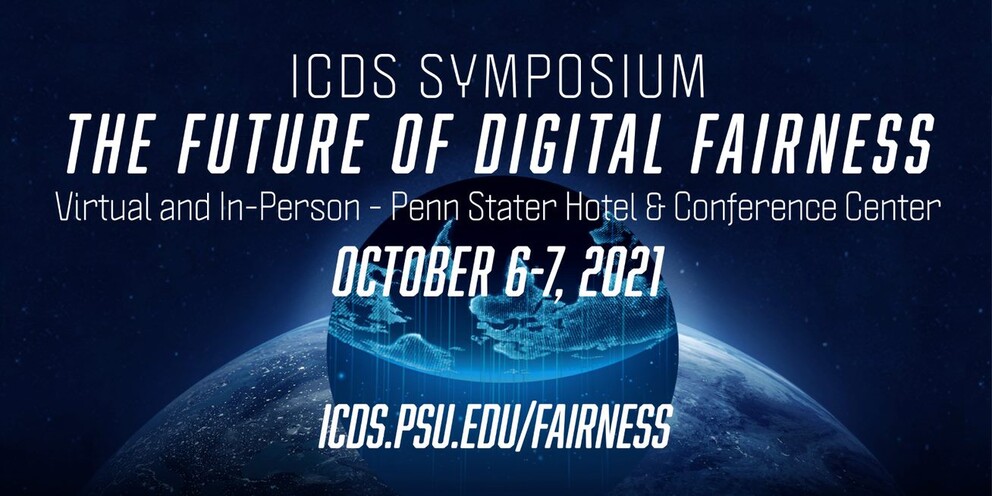
The ever-growing power of data requires an ever-deepening responsibility on the part of data scientists to use that power fairly and equitably. Recognizing this, Penn State’s Institute for Computational and Data Sciences (ICDS) will host a symposium this fall aimed at fostering digital fairness.
The two-day ICDS Fall Symposium will be held Oct. 6 and 7 to bring together researchers from around the U.S. to discuss data, equity, reproducibility and other topics related to fairness in data science. The speakers and panelists will lead discussions on the ownership of artificial intelligence (AI) models and data, unintentional bias, data manipulation transparency, reproducibility and more.
“Fairness is a fundamental requirement of effective data science,” said Jenni Evans, professor of meteorology and atmospheric science and ICDS director. “More and more, data science and AI are being used in service of society. The models relying on these data and algorithms must be grounded in human values. In this context, ‘fairness’ means that models are built upon data that capture the full range of possibilities, ensuring data security, considerations of data privacy, scanning for unintentional biases, ensuring that results are reproducible, and careful evaluation of model outcomes based on these considerations.”
Keynote speakers and panelists
Keynote speakers for the event include leaders in their fields and experts on the issues of data science and fairness.
Lorin Crawford, senior researcher at Microsoft Research, will present the keynote, "Redefining Interpretability and Replication in Multi-Ancestry Genome-wide Association Studies." Crawford is also s the RGSS assistant professor of biostatistics at Brown University. His research interests include the development of novel and efficient computational methodologies to address complex problems in statistical genetics, cancer pharmacology, and radiomics, such as cancer imaging. A central theme of Crawford’s research program is to take modern machine learning approaches and develop theory that enable their interpretations to be related back to classical genomic principles.
Keynote panel -- This panel will offer “A Fireside Chat About Data Science and Equity" with Kristin Johnson, Asa Griggs Candler Professor of Law, Emory University and Charlton McIlwain, vice provost for faculty engagement and development; professor of media, culture, and communication, New York University. The session will be moderated by Margaret Hu, associate dean for non-juris doctor programs, Penn State Law; professor of law and international affairs, and ICDS co-hire.
Panel discussions
The event will also feature interactive panel discussions on how technologies, including machine learning, artificial intelligence and big data relate to fairness in science and society.
"Ethical challenges and Considerations in the Application of Machine Learning Methods to Clinical Medicine" – In this discussion, the panel of experts will focus on ethical considerations and challenges in the application of machine learning methods to clinical data. Panelists include: Taylor Marion Cruz, assistant professor of sociology, California State University, Fullerton; Kellie Owens, postdoctoral fellow, department of medical ethics and health policy, University of Pennsylvania and Gary Weissman, assistant professor, pulmonary and critical care medicine, University of Pennsylvania.
Law, policy and data – Issues on collecting and using data are affecting every aspect of law and policy, requiring increased knowledge, awareness, and sensitivity on the part of legal professionals and policymakers. This panel of experts includes Andrew Hoskins, interdisciplinary research professor, University of Glasgow; Jennifer Wagner, assistant professor of law, policy and engineering, Penn State and Anne Washington, assistant professor of Data Policy, New York University.
Energy, justice and big data -- Advanced computing, big data, and AI will play a big role in creating more sustainable energy, especially in the Global South, but they won't deliver this benefit without ethical considerations. This panel will look at both the opportunities these technologies in helping establish carbon-free and renewable energy solutions, while supporting the fight for climate justice and equitable societal impact.
Poster session and contest
ICDS is also inviting student researchers to enter their research projects into the symposium’s poster session and contest. Student researchers will have the chance of gaining input from colleagues and the university’s own scientists, while also receiving a cloth poster that they can reuse and the chance to win $500 to further their research goals.
To learn more about the poster session, or to enter your poster, click here.
The symposium will be offered in a hybrid – with both virtual and physical options -- format.
You can learn more about ICDS’s 2021 Fall Symposium on digital fairness, or you can register for the symposium here.